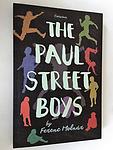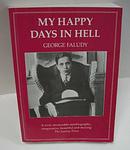The Greatest "Budapest" Books of All Time
Click to learn how this list is calculated.
This list represents a comprehensive and trusted collection of the greatest books. Developed through a specialized algorithm, it brings together 286 'best of' book lists to form a definitive guide to the world's most acclaimed books. For those interested in how these books are chosen, additional details can be found on the rankings page.
Genres
The "Budapest" category in books encompasses a diverse range of literature that is connected by the central theme of Hungary's capital city, whether through its setting, history, or cultural influence. This genre includes historical novels that delve into Budapest's rich past, from its origins as a Celtic settlement to its pivotal role in European history, including the Austro-Hungarian Empire, World War II, and the Cold War. It also features travelogues and guides that explore the city's stunning architecture, from the Gothic Revival Parliament building to the thermal baths, as well as its vibrant contemporary culture and cuisine. Additionally, the category may include memoirs and biographies of notable figures from Budapest, literary fiction that captures the city's unique atmosphere, and even crime novels or spy thrillers set against the backdrop of its bustling streets and quiet corners. In essence, books in the "Budapest" category offer readers a multifaceted look at a city that is as historically significant as it is dynamically alive.
Countries
Date Range
Reading Statistics
Click the button below to see how many of these books you've read!
Download
If you're interested in downloading this list as a CSV file for use in a spreadsheet application, you can easily do so by clicking the button below. Please note that to ensure a manageable file size and faster download, the CSV will include details for only the first 500 books.
Download-
1. Fateless by Imre Kertész
"Fateless" is a harrowing account of a Hungarian Jewish boy's experiences in Nazi concentration camps during World War II. The protagonist is sent to Auschwitz, then Buchenwald, and finally to a factory in Zeitz, enduring brutal conditions and witnessing unimaginable horrors. Despite his experiences, he maintains a detached, almost indifferent perspective, focusing on the mundane aspects of life in the camps, which further highlights the absurdity and horror of the situation. The novel explores themes of identity, survival, and the arbitrary nature of fate.
-
2. Édes Anna by Dezső Kosztolányi
"Édes Anna" is a novel that revolves around the life of a young servant girl, Anna, who works for a bourgeois family in early 20th century Hungary. The narrative explores Anna's experiences of exploitation, abuse, and societal oppression. As she navigates her way through life, her innocence and naivety are gradually eroded, leading her to commit an act of violent rebellion. The book is a potent critique of class and gender inequalities of the time.
-
3. The Case Worker by György Konrád
"The Case Worker" is a novel that follows the life of a young, disillusioned social worker in Hungary who is struggling with the grim realities of his job. He is constantly faced with the harsh and desperate situations of his clients, which include the poor, the mentally ill, and the elderly. As he tries to help them, he becomes increasingly aware of the bureaucratic and social systems that often hinder rather than aid these vulnerable individuals. This leads him to question the effectiveness of his role and the larger societal structures in place.
-
4. Epepe by Ferenc Karinthy
The book revolves around a linguist who finds himself inexplicably trapped in a nightmarish city where he cannot understand the language or communicate with the inhabitants. Despite his expertise in languages, the protagonist's skills are rendered useless in this alien environment, leading to a series of Kafkaesque encounters as he desperately tries to make sense of his surroundings and find a way back home. His isolation is compounded by the city's indifferent bureaucracy and the strange, often absurd, customs of its citizens, turning his ordeal into an existential struggle for identity and understanding in the face of an incomprehensible world.
-
5. The Paul Street Boys by Ferenc Molnár
The book is a classic coming-of-age tale set in Budapest, Hungary, at the turn of the 20th century. It follows a group of adolescent boys who are engaged in a territorial battle over a vacant lot they call the "grund," which they use as their playground. The story highlights themes of loyalty, camaraderie, and the struggles of youth as the boys defend their cherished space against a rival group. The narrative focuses on the experiences of the protagonist, who is faced with difficult moral choices and the harsh realities of growing up, as the boys' conflict mirrors the larger social and economic tensions of their time.
-
6. A Journey Round My Skull by Frigyes Karinthy
"A Journey Round My Skull" is a deeply personal narrative that takes the reader through the author's own experiences with a brain tumor and the subsequent neurosurgery. Written with a blend of humor, introspection, and medical detail, the book explores the author's changing perceptions and emotions as he confronts his mortality and the intricacies of his own mind. It is a pioneering work in the genre of medical memoirs, offering a unique window into the psychological and physical journey of a patient in the early 20th century, as well as the evolving field of neurosurgery.
-
7. My Happy Days In Hell by György Faludy
The book is an autobiographical account of a Hungarian poet's life during the mid-20th century, chronicling his experiences from his carefree youth through the rise of fascism and his subsequent imprisonment in a brutal labor camp. It is a tale of intellectual passion, political upheaval, and the resilience of the human spirit in the face of totalitarianism. The narrative captures the author's journey through a Europe ravaged by war and political strife, his encounters with notable literary figures, and his unyielding commitment to his beliefs and to poetry, even as he endures the hardships and absurdities of a communist regime.
-
8. J'ai Quinze Ans Et Je Ne Veux Pas Mourir by Arnothy Christine
The book is a poignant memoir of a young girl's harrowing experiences during World War II. At the age of fifteen, she finds herself caught in the siege of Budapest, facing the horrors of war firsthand. With a blend of youthful innocence and a will to survive, she navigates the dangers of bombings, starvation, and the threat of death. Her narrative captures the resilience of the human spirit in the face of destruction, as she clings to life and the hope for a future beyond the devastation of conflict.
-
9. Divorcing by Susan Taubes
This novel delves into the complexities of marriage, identity, and liberation through the lens of a woman embarking on a journey of self-discovery in the wake of her divorce. Set against the backdrop of mid-20th century Europe and America, it explores the protagonist's struggle to find her own voice and path amidst the societal and personal upheavals of her time. Through a series of reflective and introspective narratives, the book examines themes of love, freedom, and the quest for meaning beyond the confines of traditional roles, offering a poignant and thought-provoking look at the challenges of asserting one's individuality within the constraints of societal expectations.
-
10. The Man Who Loved Only Numbers by Paul Hoffman
"The Man Who Loved Only Numbers" is a captivating biography that delves into the life of a brilliant mathematician. From his early years as a child prodigy to his groundbreaking contributions in number theory, the book explores the eccentricities and obsessions that consumed his life. With a unique blend of mathematical concepts and personal anecdotes, the biography paints a vivid portrait of a man who was truly devoted to the world of numbers.
-
11. The Confession; Liberation Movements by Olen Steinhauer
In this espionage thriller, a series of interconnected stories unfold across different time periods, revolving around a retired Eastern European police inspector who is drawn back into a case from his past involving a plane hijacking. As the narrative weaves through the complexities of Cold War politics, liberation movements, and personal betrayals, the characters grapple with moral ambiguities and the consequences of their actions. The novel explores themes of love, loyalty, and the cost of secrets in a world where the lines between right and wrong are often blurred.
-
12. állítsátok Meg Terézanyut! by Zsuzsa Rácz
"Állítsátok meg Terézanyut!" is a comedic novel that delves into the complexities of family life through the lens of Hungarian culture. The story centers around a middle-aged woman whose children have grown up and are leading their own lives, leaving her to navigate the challenges of an empty nest. As she attempts to maintain control over her family and their affairs, her overbearing nature leads to a series of humorous and heartwarming misadventures. The novel explores themes of motherhood, independence, and the evolving dynamics of familial relationships, all while offering a satirical look at the generational gaps and societal expectations within a modern family setting.
Reading Statistics
Click the button below to see how many of these books you've read!
Download
If you're interested in downloading this list as a CSV file for use in a spreadsheet application, you can easily do so by clicking the button below. Please note that to ensure a manageable file size and faster download, the CSV will include details for only the first 500 books.
Download







